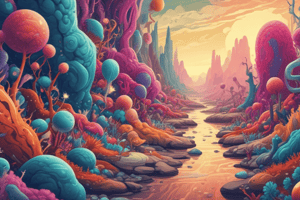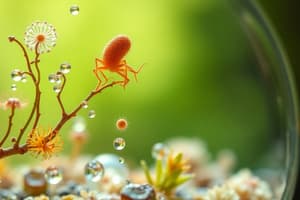Podcast
Questions and Answers
What significant contribution did Charles Chamberland make to microbiology?
What significant contribution did Charles Chamberland make to microbiology?
- Isolated the first virus studied (correct)
- Created the first recombinant DNA technology
- Discovered the first antibiotic
- Developed the process of pasteurization
What is bacterial quorum sensing primarily responsible for?
What is bacterial quorum sensing primarily responsible for?
- Cell-to-cell communication among bacteria (correct)
- Producing antibiotics
- Cell division and replication
- Gene expression in eukaryotes
What does metagenomics study focus on?
What does metagenomics study focus on?
- The role of viruses in the microbial world
- Genetic material from environmental samples (correct)
- Individual microbial species only from culture
- Cultivating microorganisms in laboratory settings
Which scientist is credited with the development of pasteurization?
Which scientist is credited with the development of pasteurization?
What are bioinformatics and genomics primarily concerned with?
What are bioinformatics and genomics primarily concerned with?
What is the primary purpose of Koch's postulates?
What is the primary purpose of Koch's postulates?
Which of the following statements about Bacillus anthracis is accurate?
Which of the following statements about Bacillus anthracis is accurate?
Who contributed to the development of agar in microbiology?
Who contributed to the development of agar in microbiology?
What event involved Bacillus anthracis in the United States in 2001?
What event involved Bacillus anthracis in the United States in 2001?
According to Koch's postulates, what must happen when a suspected microorganism is inoculated into a healthy host?
According to Koch's postulates, what must happen when a suspected microorganism is inoculated into a healthy host?
Which of the following statements correctly describes prokaryotic cells?
Which of the following statements correctly describes prokaryotic cells?
Which organism is known as an 'oil-eating bacteria' that can convert oil into bioplastics?
Which organism is known as an 'oil-eating bacteria' that can convert oil into bioplastics?
What was the significant contribution of Francesco Redi in microbiology?
What was the significant contribution of Francesco Redi in microbiology?
Which of the following groups includes true bacteria?
Which of the following groups includes true bacteria?
Who is recognized as the first person to observe microorganisms?
Who is recognized as the first person to observe microorganisms?
What defines a microorganism?
What defines a microorganism?
Which microorganism is noted as the most abundant photosynthetic organism on Earth?
Which microorganism is noted as the most abundant photosynthetic organism on Earth?
What role do microorganisms play in animal digestion?
What role do microorganisms play in animal digestion?
Which of the following is NOT a benefit of studying microbiology?
Which of the following is NOT a benefit of studying microbiology?
What is microbial ecology primarily concerned with?
What is microbial ecology primarily concerned with?
What is a major application of bioremediation?
What is a major application of bioremediation?
Which type of microorganism is used in the production of tempeh?
Which type of microorganism is used in the production of tempeh?
Microbiology is foundational to which of the following fields?
Microbiology is foundational to which of the following fields?
What was John Needham's conclusion regarding the origin of microorganisms in his broth experiments?
What was John Needham's conclusion regarding the origin of microorganisms in his broth experiments?
What was Lazzaro Spallanzani's main contribution to disproving spontaneous generation?
What was Lazzaro Spallanzani's main contribution to disproving spontaneous generation?
Which experimental design did Louis Pasteur use to prevent microbial growth in broth?
Which experimental design did Louis Pasteur use to prevent microbial growth in broth?
What was one conclusion derived from Louis Pasteur's experiments with swan-necked flasks?
What was one conclusion derived from Louis Pasteur's experiments with swan-necked flasks?
What significant medical advancement is Edward Jenner known for?
What significant medical advancement is Edward Jenner known for?
Which of the following best describes Joseph Lister's contributions to surgery?
Which of the following best describes Joseph Lister's contributions to surgery?
During the Golden Age of Microbiology, which of the following advancements was NOT made?
During the Golden Age of Microbiology, which of the following advancements was NOT made?
What role did Pasteur and his coworkers play in the development of vaccines?
What role did Pasteur and his coworkers play in the development of vaccines?
What did Spallanzani suggest about microorganisms in air?
What did Spallanzani suggest about microorganisms in air?
Which of the following statements most accurately reflects the conclusions drawn from Louis Pasteur's research?
Which of the following statements most accurately reflects the conclusions drawn from Louis Pasteur's research?
Flashcards
Microbial protein
Microbial protein
Dried cells of microorganisms used as food or feed, known as 'single cell' protein. Examples include Spirulina and Chlorella (single-celled green algae).
Alcanivorax borkumensis
Alcanivorax borkumensis
A type of bacteria that breaks down oil, converting it into bioplastics.
Spontaneous Generation Theory
Spontaneous Generation Theory
The theory that living organisms can arise spontaneously from nonliving matter. This has been disproven for larger organisms, but initially thought to be possible for microorganisms.
Francesco Redi
Francesco Redi
Signup and view all the flashcards
Anton van Leeuwenhoek
Anton van Leeuwenhoek
Signup and view all the flashcards
Pasteurization
Pasteurization
Signup and view all the flashcards
Industrial Microbiology
Industrial Microbiology
Signup and view all the flashcards
Metagenomics
Metagenomics
Signup and view all the flashcards
Genomics and Proteomics
Genomics and Proteomics
Signup and view all the flashcards
Bacterial quorum sensing
Bacterial quorum sensing
Signup and view all the flashcards
What is Microbiology?
What is Microbiology?
Signup and view all the flashcards
What are Microorganisms?
What are Microorganisms?
Signup and view all the flashcards
Are Microorganisms Ubiquitous?
Are Microorganisms Ubiquitous?
Signup and view all the flashcards
Prochlorococcus
Prochlorococcus
Signup and view all the flashcards
Microbial Role in Animal Digestion
Microbial Role in Animal Digestion
Signup and view all the flashcards
Microorganisms in Food and Beverage Industries
Microorganisms in Food and Beverage Industries
Signup and view all the flashcards
Microbial Role in Nutrient Cycling
Microbial Role in Nutrient Cycling
Signup and view all the flashcards
Bioremediation
Bioremediation
Signup and view all the flashcards
Koch's Postulates
Koch's Postulates
Signup and view all the flashcards
Bacillus anthracis
Bacillus anthracis
Signup and view all the flashcards
Anthrax
Anthrax
Signup and view all the flashcards
Agar
Agar
Signup and view all the flashcards
Petri dish
Petri dish
Signup and view all the flashcards
Spontaneous Generation
Spontaneous Generation
Signup and view all the flashcards
Needham's Experiment
Needham's Experiment
Signup and view all the flashcards
Spallanzani's Experiment
Spallanzani's Experiment
Signup and view all the flashcards
Pasteur's Swan-Neck Flask Experiment
Pasteur's Swan-Neck Flask Experiment
Signup and view all the flashcards
Golden Age of Microbiology
Golden Age of Microbiology
Signup and view all the flashcards
Lister's Contributions to Antiseptic Surgery
Lister's Contributions to Antiseptic Surgery
Signup and view all the flashcards
Immunological Studies
Immunological Studies
Signup and view all the flashcards
Vaccination
Vaccination
Signup and view all the flashcards
Smallpox
Smallpox
Signup and view all the flashcards
What is Vaccination?
What is Vaccination?
Signup and view all the flashcards
Study Notes
Introduction to Microbiology
- Microbiology is the study of microorganisms, organisms too small to be seen with the naked eye.
- Microorganisms include viruses, bacteria, protozoa, algae, and fungi.
- Microorganisms are ubiquitous, meaning they are present almost everywhere in our environment.
- Simple experiments show microorganisms are present in air, soil, and on the tongue.
What is a Microorganism?
- Microorganisms are organisms too small to be seen clearly with the naked eye.
- They are simple in structure and lack highly differentiated cells and distinct tissues.
Why Study Microbiology?
- Microorganisms are a source of nutrients, crucial for various ecological processes.
- Microbes play a key role in animal digestion, breaking down complex materials.
- The food and beverages industry heavily relies on microbial activity for processes like fermentation (bread, tempeh, chocolate, coffee).
- Microbes are essential for producing pharmaceuticals (antibiotics, vaccines, vitamins, enzymes).
- Microbes are part of the nutrient cycle, cycling carbon and nitrogen.
- Microbes have significant application to bioremediation, removing pollutants from the environment.
- Microbes are used to produce protein (dried cells of microorganisms as a food source) like Spirulina and Chlorella.
History of Microbiology
- Anton van Leeuwenhoek (1632-1723): First person to observe microorganisms using his handmade microscopes.
- Francesco Redi (1626-1697): Disproved spontaneous generation for large animals, showing maggots on decaying meat came from fly eggs.
- John Needham (1713-1781): Early proponent of spontaneous generation, believed microbes arose spontaneously in broth.
- Lazzaro Spallanzani (1729-1799): Disproved spontaneous generation in broth by boiling solutions and sealing flasks, showing air (oxygen) was essential for the process.
- Louis Pasteur (1822-1895): Further disproved spontaneous generation, using swan-necked flasks He showed microbes from the air contaminated the broth if the flasks were tilted.
- Joseph Lister (1827-1912): Showed that microorganisms were causal agents of disease and developed surgical techniques to prevent microbial entry into wounds.
- Edward Jenner (1749-1823): Developed vaccination procedures to protect individuals from smallpox.
- Koch's Postulates (Robert Koch 1843-1910): Provide a method to establish a link between a microorganism and a disease.
- Koch demonstrated the relationship between Bacillus anthracis and anthrax.
- Angelina Hesse: Developed the use of agar for growing microorganisms, a crucial tool in microbiology.
- Alexander Fleming: Discovered penicillin, an antibiotic.
- Chamberland filters: Used to isolate and study microbial pathogens.
Microbiology Today and Future
- Modern microbiology uses recombinant DNA technology, bioinformatics, genomics, and proteomics.
- Bacterial quorum sensing allows for communication and information-sharing among bacteria.
- Metagenomics studies genetic material recovered directly from the environment.
- Future challenges and opportunities in microbiology involve a shift towards more molecular approaches, including environmental-metagenomics, a better understanding of bacterial quorum sensing, and the use of bioinformatics tools.
Golden Age of Microbiology
- Occurred between 1857 and 1914.
- Many disease-causing organisms were discovered.
- Significant advancements in microbial metabolism were studied.
- Improved techniques for microbial study were developed.
- A deeper understanding of the role of immunity and methods for controlling or preventing microbial infection emerged.
Industrial Microbiology
- Fermentation processes, like alcohol fermentation, are driven by microbial activity.
- Pasteurization is a microbial control method to preserve wine during storage and other products.
Studying That Suits You
Use AI to generate personalized quizzes and flashcards to suit your learning preferences.




